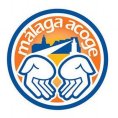147 - It's All About Tongues
Wednesday, June 17, 2015
Dentists don’t often make me laugh. Sadly, it’s years since they were allowed to use laughing gas to knock us out before an extraction. And I’m a really rubbish patient. But my Spanish dentist is lovely. Film-star looks, craggy, sexy voice, about the right age ….. COUGH! Sorry, I wandered off for a moment there! Anyway, back on topic, he DID make me laugh.
We’d talked through in detail what he was going to do. I had a previously-filled tooth which had broken, and most of the filling had fallen out too. He was going to dig the rest out (see why I don’t like dentists?), refill it, then prepare it for a crown (corona in Spanish). After going over the process again, the chair went back and l relaxed (though not a lot). He has a nice bedside manner, and chatted about all sorts of things. Well, more accurately, he chatted and I dribbled. He thought my Spanish had improved even in the last couple of months. I always feel better when people compliment my Spanish. He probably says it to all his extranjero patients as it’s cheaper than anaesthetic! why I don’t like dentists?), refill it, then prepare it for a crown (corona in Spanish). After going over the process again, the chair went back and l relaxed (though not a lot). He has a nice bedside manner, and chatted about all sorts of things. Well, more accurately, he chatted and I dribbled. He thought my Spanish had improved even in the last couple of months. I always feel better when people compliment my Spanish. He probably says it to all his extranjero patients as it’s cheaper than anaesthetic!
Then suddenly he started telling me what a difficult language it is. What a big problem the language is. Despite the heap of assorted fingers and metal instruments in my mouth, I managed to disagree. He insisted, repeating it was the most difficult language he had ever fought against. I dribbled, disagreeing. And disagreed, dribbling.
“Why can’t we get this language under control?” he said, in exasperation. Suddenly it dawned on me. Just as in English, “language” and “tongue” are the same word! He was annoyed with my uncontrollable tongue, along with all the dentists I have ever encountered. It will never stay neatly to one side, it wanders over to get in the way, and pushes random drills and instruments out of my mouth.
“¡Ésta lengua es la peor que he encontrado en toda mi vida!” he sighed. “This tongue is the worst I have come across in my whole life!” He added quickly “Not the patient, just the tongue”, and got the nurse to put a dental dam in – a tarpaulin-sized sheet of rubber to trap my tongue where he wanted it, out of the area of activity. Finally it behaved, for long enough for him to finish the filling. “¡Y ya esta!” – he sighed in relief. I don’t THINK it was because he couldn’t face my roving uncontrollable tongue back in his consulting room, but he gave me the good news that he felt he had done a good enough job filling the tooth, that we didn’t need to go ahead with the more expensive crown. It’s very rare for me to be amused by anything involving dentists, but that confusion over “lengua”and “lengua” did raise a chuckle. tongue”, and got the nurse to put a dental dam in – a tarpaulin-sized sheet of rubber to trap my tongue where he wanted it, out of the area of activity. Finally it behaved, for long enough for him to finish the filling. “¡Y ya esta!” – he sighed in relief. I don’t THINK it was because he couldn’t face my roving uncontrollable tongue back in his consulting room, but he gave me the good news that he felt he had done a good enough job filling the tooth, that we didn’t need to go ahead with the more expensive crown. It’s very rare for me to be amused by anything involving dentists, but that confusion over “lengua”and “lengua” did raise a chuckle.
The weekend before had involved another “interchange of tongues” – this time purely in the linguistic sense! A group of 20 went walking in the Alpujarras mountains, a wonderful combination of fresh air, superb high-level walks, excellent company, and more steps forward in colloquial Spanish. The Spanish half of the group delighted in teaching us slightly rude phrases – we had a hysterical hour walking between two gorgeous Alpujarran pueblos, discussing the different levels of asking to be left alone on a beach or in a bar – going right up to some really quite rude options, both in Spanish and in English! And some of my Spanish friends continued the tradition of high-fiving me on every successful subjunctive. forward in colloquial Spanish. The Spanish half of the group delighted in teaching us slightly rude phrases – we had a hysterical hour walking between two gorgeous Alpujarran pueblos, discussing the different levels of asking to be left alone on a beach or in a bar – going right up to some really quite rude options, both in Spanish and in English! And some of my Spanish friends continued the tradition of high-fiving me on every successful subjunctive.
The oddest part of the weekend was how local people we encountered en route couldn’t work out our group. Some of us would clatter into the bar first, and start ordering cold drinks. As the rest trickled in behind us, the barman and the other customers would turn to stare at us. “¿Eres español?” Well clearly not. Oddly, the Catalan man was asked the same question! Jean confused everyone too – he is American with a clear US accent, but of Spanish parents so speaks fluently. Customers tapped gently on my shoulder, asking what our group was. Well, a mixture of a group of friends, British, Spanish, a smattering of other nationalities, coming together once a month to practise languages but mostly just to hang out, explore new corners of Andalucía, and this time to spend a weekend walking. The frequency and intensity of the interest surprised me. Surely a multi-national group of friends isn’t so strange? to stare at us. “¿Eres español?” Well clearly not. Oddly, the Catalan man was asked the same question! Jean confused everyone too – he is American with a clear US accent, but of Spanish parents so speaks fluently. Customers tapped gently on my shoulder, asking what our group was. Well, a mixture of a group of friends, British, Spanish, a smattering of other nationalities, coming together once a month to practise languages but mostly just to hang out, explore new corners of Andalucía, and this time to spend a weekend walking. The frequency and intensity of the interest surprised me. Surely a multi-national group of friends isn’t so strange?
Sunday afternoon and we limped back into Capileira after a second high mountain walk. Most hugged and kissed their farewells and rushed off, but Martxe and Joan (pronounced as Joanne, but in Catalunya it is a man’s name) and I had been getting into a deep political conversation about neo-capitalism, new systems of co-existence, communes, communities and communitarianism, and animal rights and environmental policies in Spain, and we didn’t want to stop. Several drinks and two hours later, replete with tapas and content with our shared world vision, Martxe walked down to her village cave house, and Joan and I returned to our cars and began the winding drive back down to the highway. If the weekend were to have been a subjunctive, it would have merited a high-five. as Joanne, but in Catalunya it is a man’s name) and I had been getting into a deep political conversation about neo-capitalism, new systems of co-existence, communes, communities and communitarianism, and animal rights and environmental policies in Spain, and we didn’t want to stop. Several drinks and two hours later, replete with tapas and content with our shared world vision, Martxe walked down to her village cave house, and Joan and I returned to our cars and began the winding drive back down to the highway. If the weekend were to have been a subjunctive, it would have merited a high-five.
© Tamara Essex 2015 http://www.twocampos.com
THIS WEEK’S LANGUAGE POINT:
That was a useful weekend, good immersion in Spanish, some subjunctive practice and a few high-fives. Back in the city on the Monday morning at the dentist, I discovered how useful this kind of intensive practice really is.
I arrived early, but waited endlessly in the dentist’s waiting room. 45 minutes later than my appointment, I sought out the receptionist and asked if there was a problem. “No, all is fine” she said. “But the dentist had to deal with an emergency first.” “Ah, vale. Pero si me lo hubieras dicho más pronto, lo habría entendido antes, sin preocuparme tanto” I said. Without pausing, without thinking, and without stumbling. Only afterwards, lying on the dentist’s chair, did I realise that it was not at all a bad sentence for a student! “OK, but if you had told me sooner, I would have understood, without worrying so much.” 
I mentally high-fived, none of my friends being there to do it. ¡Choca los cinco! Then I went back to dribbling.
 0
Like
Published at 5:11 PM Comments (0)
0
Like
Published at 5:11 PM Comments (0)
146 - A Matter of Taste
Wednesday, June 10, 2015
A bit of fun before the final exams. La Escuela Oficial de Idiomas ran an informal cookery competition amongst all the extranjeros learning Spanish, and we all had to bring a dish representative of our own countries.
Quite tough to pick something representative of British cuisine – and something that I could make! I’m not a great cook, being a strong advocate of the idea that it’s important to support local bars and restaurants who do these things so much better than I ever can.  Fortunately a good friend (and a great cook!) was over, she helped me whip up a dish of salted caramel and I put sliced apple and strawberries beside it for dipping. The harder challenge was to write something (in Spanish of course) about the dish and why it represents my country. Well, it doesn’t, of course! It’s a French dish, created by Henri Le Roux in the 1970s, using Breton sea salt. So not really English at all, but at least there was something to write about, and on the day, when we each had to introduce our dish in Spanish, I could explain its history and its current popularity in the UK – mostly thanks to “Masterchef”. Fortunately a good friend (and a great cook!) was over, she helped me whip up a dish of salted caramel and I put sliced apple and strawberries beside it for dipping. The harder challenge was to write something (in Spanish of course) about the dish and why it represents my country. Well, it doesn’t, of course! It’s a French dish, created by Henri Le Roux in the 1970s, using Breton sea salt. So not really English at all, but at least there was something to write about, and on the day, when we each had to introduce our dish in Spanish, I could explain its history and its current popularity in the UK – mostly thanks to “Masterchef”.

The table groaned with fabulous plates from around the world. There were dishes from Syria, Iran, Morocco, Italy, India, France, Russia, Turkey, Norway, Brazil, Palestine, Austria, Scotland, Finland, and Malaysia. A woman from Wimbledon brought strawberries and clotted cream, and a student from the US brought an ironic platter of rather delicious hamburgers.
It was a feast of “local” food, only lacking Spanish dishes. Everyone’s locality was represented, everything had been prepared with love and good memories of home, and everything was delicious. It was fascinating to think about how and why food has developed differently in different cultures, why tastes have evolved so differently. The salted caramel at first sounded too bizarre for people to want to try. The five Spanish school staff in particular seemed very wary. Then suddenly after a couple of people had cautiously tried dipping apple into the thick gooey caramel, word got round and a crowd gathered. Maria, the Spanish teacher, stole the recipe from under the plate. It’s a taste that hasn’t entered Spanish cuisine yet – I had asked several chefs, cooks, and ice-cream parlours for the name in Spanish but was met with blank expressions and questions of why would anyone add salt to caramel? developed differently in different cultures, why tastes have evolved so differently. The salted caramel at first sounded too bizarre for people to want to try. The five Spanish school staff in particular seemed very wary. Then suddenly after a couple of people had cautiously tried dipping apple into the thick gooey caramel, word got round and a crowd gathered. Maria, the Spanish teacher, stole the recipe from under the plate. It’s a taste that hasn’t entered Spanish cuisine yet – I had asked several chefs, cooks, and ice-cream parlours for the name in Spanish but was met with blank expressions and questions of why would anyone add salt to caramel?

Back in Colmenar it was the romeríaand the village was full of horses, donkeys and oxen pulling carriages. A lunch of drinks and tapas with friends as the horses went by, was interrupted by a man wanting to sell his last box of nisperos. I gave in, and handed over the 2.50€ he wanted for probably 2-3 kilos of fruit. On spotting my “guiri” accent, he went back to his van and brought me a sack of lemons to buy. I refused, as my lemon tree is now fruiting well. He whipped out an ancient pocket-knife and quartered a lemon onto an empty tapas plate. Deep from a filthy pocket emerged a bulb of garlic, which he opened and skinned, and sliced onto the lemon. Then, from the other trouser pocket, came a plastic pouch of freshly-ground black pepper, which he proceeded to sprinkle all over the lemon. The final touch was some sea salt. He offered us the platter with a flourish.
 We could not have been less tempted. What had started out as a delicious, juicy, beautiful lemon, had been desecrated with a ton of black pepper. Salted caramel I can do, very happily, but peppered salted garlicky lemon was a step too far. Fortunately one friend was made of sterner stuff, and under the fixed gaze of the nispero-salesman, she bravely picked the least-peppery chunk of lemon. She was about to put it in her mouth when he stopped her, pointing out that her slice lacked garlic. “Oh of course,” she said, “how silly of me!” and added a sliver of raw garlic to the mouthful while her boyfriend giggled unsupportively beside her. With only an imperceptible pause, in went the unappetising morsel. Her face set in a rictus grin. Her eyebrows disappeared under her fringe. Sweat appeared on her brow. Time stood still. We could not have been less tempted. What had started out as a delicious, juicy, beautiful lemon, had been desecrated with a ton of black pepper. Salted caramel I can do, very happily, but peppered salted garlicky lemon was a step too far. Fortunately one friend was made of sterner stuff, and under the fixed gaze of the nispero-salesman, she bravely picked the least-peppery chunk of lemon. She was about to put it in her mouth when he stopped her, pointing out that her slice lacked garlic. “Oh of course,” she said, “how silly of me!” and added a sliver of raw garlic to the mouthful while her boyfriend giggled unsupportively beside her. With only an imperceptible pause, in went the unappetising morsel. Her face set in a rictus grin. Her eyebrows disappeared under her fringe. Sweat appeared on her brow. Time stood still.
The nispero man offered me the plate. With a sideways glance at her now quivering lower lip, I dug underneath for a piece of lemon which may have missed the onslaught of salt and pepper, and wiped it surreptitiously on the plate. His hand went back into his pocket and he waved the bag of pepper at me. “No, no, it’s fine, thank you. No really. No!” I insisted. The lemon was sharp, fresh from the tree, but with the sweetness of lemons that mature fully in the Andalucían sunshine. Then unfortunately the pepper I had been unable to scrape off kicked in and my face screwed up. “You like it?” he asked. Not great at reading body-language, this guy. “It’s …. umm …. an interesting flavour,” I spluttered. “We generally like lemon without black pepper” I explained, pointlessly. “But the garlic is good, no?” he asked, pressing for the compliment we were struggling to give. “Yes,” I said, “the garlic is delicious”. and he waved the bag of pepper at me. “No, no, it’s fine, thank you. No really. No!” I insisted. The lemon was sharp, fresh from the tree, but with the sweetness of lemons that mature fully in the Andalucían sunshine. Then unfortunately the pepper I had been unable to scrape off kicked in and my face screwed up. “You like it?” he asked. Not great at reading body-language, this guy. “It’s …. umm …. an interesting flavour,” I spluttered. “We generally like lemon without black pepper” I explained, pointlessly. “But the garlic is good, no?” he asked, pressing for the compliment we were struggling to give. “Yes,” I said, “the garlic is delicious”.
Happy enough with that, and with his 2.50€ for the nisperos, he finally went back to his 1960s pick-up, patted the scrawny dog that was gazing adoringly at him from the passenger seat, threw the truck into some inappropriate gear, and drove off into the campo.
© Tamara Essex 2015 http://www.twocampos.com
THIS WEEK’S LANGUAGE POINT:
A bunch of us were out one night for drinks and tapas in Málaga city centre. A good choice of tapas, included free with each drink. I’d tried some of the more recognisable tapas on a previous visit so decided to be a bit more adventurous. I liked the sound of“Rollo Frito Pollo”.
“Una pregunta, por favor” I said to the waitress. “Este Rollo Frito Pollo, que es?” She looked at me. “Pues, es un rollo,”. She paused. “Esta frito ….” She paused again, unsure as to how to continue. “…. y lleva pollo.”
Ah yes. And the moral of that is, in any language, don’t ask silly questions.
 0
Like
Published at 6:56 PM Comments (4)
0
Like
Published at 6:56 PM Comments (4)
145 - The Notary, the Copy-Shop Clerk and the Immigration Advisor
Thursday, June 4, 2015
Sounds like the beginning of a joke, doesn’t it? “A notary, a copy-shop clerk and an immigration advisor go into a bar …”. Sadly it was no joke. It was a week of admin and bureaucracy. And it was time-consuming.
My friends needed a very simple legal process carried out. Or so they thought. They needed their signatures witnessed so that a house sale in the United States could complete in their absence. They didn’t need any documents translated, they didn’t need any of the house sale documents notarised. They just needed a notary’s stamp to say “Yes, these are the original signatures of these two people”. Simple, no? No.
 I popped in to the notary’s office in the morning to get a rough idea of price, and to ask if we needed an appointment. “What’s it for?” the receptionist asked me. “Just to witness their signatures, nothing more.” “Yes but what will they be signing?” she asked me. I wasn’t sure – I hadn’t asked them. “Something to do with selling a house. Just their signatures, as they won’t be in the United States to sign on the day.” “Do you have the documents in Spanish?” “Well no, because all the parties and all the lawyers speak English” I replied, wondering if this was going to turn out to be a teeny bit more complicated than I had thought …. I popped in to the notary’s office in the morning to get a rough idea of price, and to ask if we needed an appointment. “What’s it for?” the receptionist asked me. “Just to witness their signatures, nothing more.” “Yes but what will they be signing?” she asked me. I wasn’t sure – I hadn’t asked them. “Something to do with selling a house. Just their signatures, as they won’t be in the United States to sign on the day.” “Do you have the documents in Spanish?” “Well no, because all the parties and all the lawyers speak English” I replied, wondering if this was going to turn out to be a teeny bit more complicated than I had thought ….
The receptionist sighed, and sent me in to see Carmona. He had a big desk, as befits a notary. It had flags and symbols. Very legal, very notary-ish, very Spanish. He asked the same questions. I gave the same answers. I didn’t have any more information. He sighed too, and told me to come back at 5pm with them, and he would see us then. “They must bring passports and all the papers” he added.
We met outside. They had brought everything, including two friends who were staying with them from the UK. I asked if the friends wanted to go wandering up Málaga’s famous Calle Larios while we were doing the notary’s office, but they said they’d pop in with us, and do the touristy bits afterwards.
The receptionist recognised me and waved us towards Carmona’s desk. We waited outside on big squishy sofas while he finished with his previous client, and finally he waved us in. “These are the people I told you about. The lawyer in the United States JUST needs that their signatures be witnessed as genuine, as they are completing the sale and they cannot be there in the United States to sign in person.” “But what is the document?” he asked. “Well it’s just a short document confirming the sale, and it just needs their signatures, stamped by a notary to confirm that they have signed.” “Do you have a copy in Spanish?” he asked. “Umm, no!” So at that stage I had to take him through the document, paragraph by paragraph, translating it into Spanish. A tad more technical than I’d expected! I emphasised that the couple had a very good lawyer in the US and really just needed to sign the document in front of the notary and get it stamped. But it was not going to be as straightforward as that. document?” he asked. “Well it’s just a short document confirming the sale, and it just needs their signatures, stamped by a notary to confirm that they have signed.” “Do you have a copy in Spanish?” he asked. “Umm, no!” So at that stage I had to take him through the document, paragraph by paragraph, translating it into Spanish. A tad more technical than I’d expected! I emphasised that the couple had a very good lawyer in the US and really just needed to sign the document in front of the notary and get it stamped. But it was not going to be as straightforward as that.
We all handed over our identification, which was photocopied, and our passport numbers entered into the computer. Carmona printed off a 5-page legal document in Spanish and asked me to explain it to my friends. Meanwhile, he made various changes to it on the computer, inserting their names etc, and inserting a paragraph about me as the translator, which was a bit daunting as I am very far from being that! Then he printed that version out and showed us where to sign. With great relief that we’d finally got there, we got our pens out to sign. “No!”shouted Carmona. “You have to sign in front of the notary!” Ummm ….“Are you not the notary?” we asked. “No!” he laughed, and proceeded to throw another massive great spanner into the works. “After you are here” he said, “You must go to another office the other side of the river to get the other stamp.” “WHAT?!?! What other stamp?” “The Stamp of The Hague” he intoned, giving it enormous importance. “And we can’t get that here?” we asked, incredulously. “No! There is only one in Málaga, you must queue separately there.” and showed us where to sign. With great relief that we’d finally got there, we got our pens out to sign. “No!”shouted Carmona. “You have to sign in front of the notary!” Ummm ….“Are you not the notary?” we asked. “No!” he laughed, and proceeded to throw another massive great spanner into the works. “After you are here” he said, “You must go to another office the other side of the river to get the other stamp.” “WHAT?!?! What other stamp?” “The Stamp of The Hague” he intoned, giving it enormous importance. “And we can’t get that here?” we asked, incredulously. “No! There is only one in Málaga, you must queue separately there.”
We knew we had to get to the courier company before it closed, and we had already been at the notary’s office over two hours without actually seeing a notary. We decided quickly that all the lawyer in the US had asked for was an official witness to their signatories – we could do without the second stamp. Carmona looked shocked, and sent us back outside to wait.
Time ticked by. Their visiting friends were tapping their fingers on the sofa. Eventually an efficient-looking woman emerged and we followed her and Carmona into a grander office. She then read out the five-page document incredibly fast, and I summarised it again for my friends. Basically it identified them and me and listed our ID documents. It cleared the notary of any responsibility for the content of the documents related to the house purchase, absolved the notary of any responsibility for my translation, and also removed any responsibility from me (phew!) in case of my translation skills being somewhat below par. Finally everything was signed, and for the privilege of not being responsible for anything, the notary removed a large chunk of money from my friends. friends. Basically it identified them and me and listed our ID documents. It cleared the notary of any responsibility for the content of the documents related to the house purchase, absolved the notary of any responsibility for my translation, and also removed any responsibility from me (phew!) in case of my translation skills being somewhat below par. Finally everything was signed, and for the privilege of not being responsible for anything, the notary removed a large chunk of money from my friends.
At the copy-shop which doubled as the DHL courier collection point, we discovered that we were part of “client practice” for a new trainee. Painstakingly-slowly and with more mistakes than there were words on the screen, she typed my friend’s details onto the DHL system. Copying from the passport, she typed “British Citizen” as the surname, and when I pointed this out, she said “But it says it here, in the passport”. I watched her like a hawk. These precious (and rather expensive) documents were being sent across the ocean based on a label typed by someone for whom writing her own name may be too arduous a task. We showed her the destination address. She entered the street where it asked for the recipient, the name of the company where it asked for the town, and then got stuck because the recipient’s name wouldn’t fit in the box clearly asking for the zip code. My anguished expression brought the manager over who slowly took the trainee through the process again. After what felt like an age, the precious DHL sticker was produced and the envelope sealed and (only slightly nervously) handed over to the trainee. It’s a good thing that people with learning difficulties are included in mainstream jobs, though it is mildly disconcerting when the manager takes a break during the crucial part of dispatching the envelope ….. ocean based on a label typed by someone for whom writing her own name may be too arduous a task. We showed her the destination address. She entered the street where it asked for the recipient, the name of the company where it asked for the town, and then got stuck because the recipient’s name wouldn’t fit in the box clearly asking for the zip code. My anguished expression brought the manager over who slowly took the trainee through the process again. After what felt like an age, the precious DHL sticker was produced and the envelope sealed and (only slightly nervously) handed over to the trainee. It’s a good thing that people with learning difficulties are included in mainstream jobs, though it is mildly disconcerting when the manager takes a break during the crucial part of dispatching the envelope …..
A couple of days later I took a Nepalese friend to the charity that helps immigrants in Málaga. Through a series of life changes, she had ended up without a valid visa after her student visa had expired. I phoned the charity in the morning to check their closing time and that there would be someone who could speak to my friend, who was coming to Málaga especially, from quite a way inland. “Yes that’s fine, we are open until 3pm and even if you arrive late there is always someone here to deal with emergencies.” That sounded really helpful, really supportive, and despite her difficult journey we walked quickly across the city and got there in good time before they closed. “Hello” I said to the four ladies in the office. “I phoned this morning, can someone come and talk to my friend?” Two of them started explaining to me in rapid Spanish that if it was an issue about a visa she would need to go to a lawyer and their lawyer was on holiday and there wasn’t anyone who could advise her. “Hang on, slow down! But I phoned this morning, and she has had a 3-hour journey to get here, can you at least come out and speak direct to her?” “Well, we aren’t legal advisors, she has to go to the lawyer.” “Please come and talk to her so that she feels someone is advising her.” “Well we’re not the advisors, and the lawyer who works here is on holiday.” “Right but can you at least explain that to her face?” Eventually one of the staff members came out to see my friend and gave her the details of the two other lawyers’ offices that would give her free advice and help her get her visa sorted. four ladies in the office. “I phoned this morning, can someone come and talk to my friend?” Two of them started explaining to me in rapid Spanish that if it was an issue about a visa she would need to go to a lawyer and their lawyer was on holiday and there wasn’t anyone who could advise her. “Hang on, slow down! But I phoned this morning, and she has had a 3-hour journey to get here, can you at least come out and speak direct to her?” “Well, we aren’t legal advisors, she has to go to the lawyer.” “Please come and talk to her so that she feels someone is advising her.” “Well we’re not the advisors, and the lawyer who works here is on holiday.” “Right but can you at least explain that to her face?” Eventually one of the staff members came out to see my friend and gave her the details of the two other lawyers’ offices that would give her free advice and help her get her visa sorted.
It was frustrating, especially for my friend. But I was frustrated too, having described this organisation as one that could help her. Afterwards over a sandwich we agreed that it hadn’t been a complete waste of time, as we now had access to the free legal advice, but having worked for charities for thirty years I had just wanted them to treat her more as a human and less as someone to be bundled out of the office as quickly as possible. It was a clear reminder that (a) charities in every country are overloaded with work; and (b) immigrants and their problems are often given short shrift, making them feel a nuisance and a burden. Is there no time for a smile, a touch on the arm, and a word of encouragement?
None of these brushes with bureaucracy went smoothly. To be fair, the copy-shop trainee had successfully produced the address sticker, the envelope did arrive safely in the US for the completion of the house-purchase, and the lawyers there were perfectly happy with just the one stamp. But is there no simpler way to witness a signature? Should the copy-shop manager really have abandoned a not-very-competent trainee? Have the charity staff forgotten that their work is about humans, not about paper? And above all, how do people find their way through this maze of bureaucracy without speaking the language, and without having the whole day free just to complete one simple task?
 Back in the joke, the notary, the copy-shop clerk and the immigration advice-worker are in the bar arguing about paying the bill. The notary can’t pay unless the bill is stamped and witnessed, the copy-shop clerk can’t pay unless it’s in triplicate, and the immigration adviser can’t pay anything until the lawyer comes back from holiday. So their bar bill gets passed on to us. Same old story. Back in the joke, the notary, the copy-shop clerk and the immigration advice-worker are in the bar arguing about paying the bill. The notary can’t pay unless the bill is stamped and witnessed, the copy-shop clerk can’t pay unless it’s in triplicate, and the immigration adviser can’t pay anything until the lawyer comes back from holiday. So their bar bill gets passed on to us. Same old story.
© Tamara Essex 2015 http://www.twocampos.com
THIS WEEK’S LANGUAGE POINT:
Known and unknown. Another key to the subjunctive. Imagine you are at work and you receive an order from a Danish client. You need someone who can read Danish, so you go out to the big office where all the secretaries are.
If you KNOW there is a secretary who speaks Danish but you don’t know who it is, you use the indicative (normal) tense … “Necesito la secretaria que sabe danés.”
If you don’t know whether what you want exists, you use the subjunctive. “Necesito una secretaria que sepa danés.”
 2
Like
Published at 12:00 PM Comments (4)
2
Like
Published at 12:00 PM Comments (4)
Spam post or Abuse? Please let us know
|
|